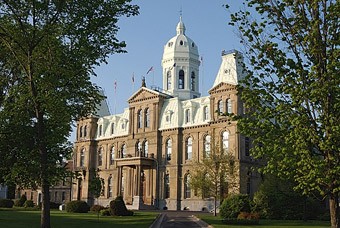New Brunswickers hit with Ottawa's unfair carbon tax

This column was published in the New Brunswick Telegraph-Journal on April 4, 2019.
Welcome to life under Ottawa’s carbon tax. This week, New Brunswickers are officially paying the new tax.
The carbon tax will increase the cost of gas by 4.42 cents per litre this year, rising to 11 cents per litre in 2022. The HST will be applied on top of the carbon tax, so it will add 5.1 cents per litre total. That’s on top of existing gas taxes, which already account for 34 per cent of the cost of gas in New Brunswick. It will also increase the cost of home heating, groceries, diapers, and nearly everything you buy.
The carbon tax will jack up the cost of government services taxpayers pay for and put a strain on businesses across the province.
New Brunswickers have clearly told Ottawa that they can’t afford a carbon tax.
The Higgs government opposes the tax, launching a court case against it and officially intervening in the court cases launched by other provinces fighting the tax.
Even former New Brunswick Liberal premier Brian Gallant didn’t agree to bring in the tax. Instead, he proposed to relabel and repurpose portion of New Brunswick’s existing gas tax.
The Liberals and the Tories don’t agree on much, but they both agree on this: New Brunswickers already pay enough gas taxes. But did Ottawa get the message? No.
The federal Liberals have even been running campaign-style advertisements, attacking the politicians who oppose Ottawa’s carbon tax in the four provinces (such as New Brunswick) where the governments have stood up against Ottawa’s carbon tax.
The hypocrisy is rich. Politicians in Ottawa spew out more carbon emissions than many New Brunswickers will in their lifetimes.
The federal government flew nearly 300 people to Paris for COP21 climate talks in 2015, costing taxpayers more than $1 million. About $234,000 of that was spent on travel alone.
Prime Minister Justin Trudeau’s $1.5 million trip to India last year cost taxpayers over $485,000 on flights alone – including flying a Canadian chef to India to cook an Indian meal.
Those are big price tags – and an enormous amount of unnecessary carbon emissions for a government telling New Brunswickers they have to pay more when they start up the minivan to go to work or pick up groceries.
In most of New Brunswick, changing your lifestyle to avoid the carbon tax is a virtual impossibility. In a province lacking heavily dense urban centres, with harsh winters, walking or biking from your high-rise condo to work isn’t realistic for most New Brunswickers.
The federal government says it will compensate New Brunswickers to mitigate some carbon tax costs, but many of those costs are hidden.
For one, the carbon tax will force businesses to raise prices. But not every mom-and-pop shop can do that. Business groups in New Brunswick and across Canada have warned that Ottawa’s carbon tax will force them to cut wages, eliminate jobs or limit business growth.
New Brunswick already struggles to compete with other parts of Canada and the U.S. for investment, jobs and people. The carbon tax will make the province even less competitive.
Hospitals, ambulances and school buses are critical, but they’re also emissions-intensive. That means the cost of these government services will go up under the carbon tax, and taxpayers will be footing that bill too.
New Brunswick isn’t alone in the fight against Ottawa’s carbon tax. Three other provinces are fighting the tax, and the ongoing Alberta election will determine if a fifth province will join in.
It’s time for Ottawa politicians to cut the hypocrisy. New Brunswickers can’t afford the carbon tax and they shouldn’t have to.
Paige MacPherson is Atlantic Director of the Canadian Taxpayers Federation.